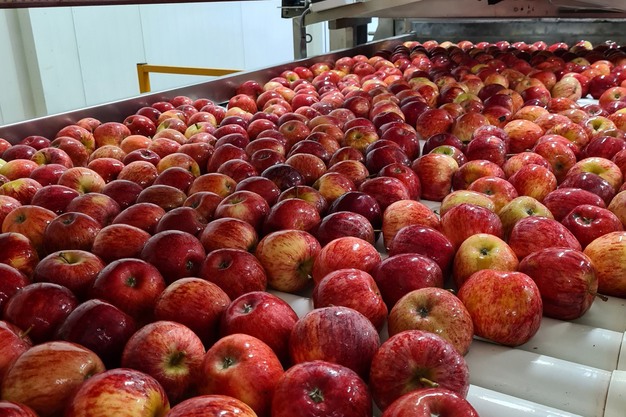The first stretch of the Portuguese apple season might not be representative of what is in store for the season next, says João Juma, Export Manager of United Growers, based in Lisbon: "The Portuguese apple season has been a strange one. Although apple production all over Europe was relatively smaller due to the warm weather conditions Europe faced during the summer, we can see that overall the pressure and colouration of the apple in countries such as France, Italy, Poland, Serbia, Moldova and Ukraine are creating some obstacles for these producing countries in terms of storage conditions."
According to Juma, a lot of apple exporters are trying to sell off their produce as fast as they can, to avoid having to store them for later. "We expected to have a better market in this first half of the season, but we faced a very competitive situation, due to the efforts these countries are putting into selling at cheaper prices, to avoid storage. As a result, the market is flooded at the moment and movement is slow. However, we're happy to have comparatively better conditions for storage and colouration, which will value the product available for the second half of the season and with surely lower the struggle with competition."
The slower market with an abundance of availability wasn't exclusive to the European market, Juma explains. Latin America had a similar situation, although this seems be improving as stocks run out: "As the apple season started earlier, it took time for Latin America to start absorbing the volumes in a manner that we expected, due to existing stocks, high supply and lower prices from other European countries. However, this is changing rapidly as stocks from Chile in South America are being depleted."

For Juma, it's clear what the Portuguese apple exporters have to do; wait it out and receive better prices. "So far, export prices to South America have been stable, and at least the Portuguese companies are not in a rush to sell at low prices, to match what other origins are doing. As explained, these countries are trying to sell as fast as they can, as they face issues of storage. As such, we prefer to wait it out for better prices. Another reason for the stability is related to fixed costs, which are high for everyone and although companies need to sell, nobody wants to sell at a loss."
With the logistical situation with the Red Sea, United Growers has had to switch its focus from the usual primary markets, Juma explains: "With a lower production, we need to create value in the product to cover expenses, so the main challenge has been to change our traditional markets in the Middle East and Asia, switching to other markets so that we can receive better returns. On one hand, we want to continue the brand present in markets that were primary for us, but on the other hand we need to give the best possible returns to our suppliers. That being said, we also still have the Red Sea issue affecting transit times and therefore we've been prioritizing faster deliveries with less risk."
Looking forward, the second half of the apple season should be completely different. "We expect very high prices from January onwards, with low stocks all over Europe. There will only be few growers with the possibility to keep their apples stored properly. It's very likely that we'll have to import to cover our domestic needs and therefore we are open to speak to other growers regarding this matter. We're happy to deliver the same quality our clients have been used to, so for us that's the most important. We're still looking to develop new relationships in Latin America and this is the best time to do so, as from early next year we'll only deliver to existing customers," Juma concludes.
For more information:
João Juma
United Growers Lda
Tel: +351 21 0935 261
M: +351 910 645 600
[email protected]
www.portugalapples.com
www.unitedgrowers.pt
